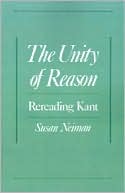

 |

|

The average rating for The Unity of Reason: Rereading Kant based on 2 reviews is 3.5 stars.
Review # 1 was written on 2019-03-02 00:00:00 Chris Reder Chris RederThis is, in general, an excellent book that focuses on Kant's account of reason (Vernunft). Up to its publication in 1994, few Kantians focused on the role of reason in Kant's critical philosophy. Indeed, even today, much more effort is spent unraveling Kant's ethical theory or his theory of the understanding than on his theory of reason. And yet, Neiman argues, Kant's theory of reason could actually be one of the most innovative features of his thought. The book itself is divided into five main chapters in addition to an introduction. The first chapter is devoted largely to articulating a Leibnizian view of reason according to which reason is a matter of following procedural laws. As Neiman shows, Leibniz hoped to work out a universal characteristic through which all truths could be systematically discovered. Such a universal characteristic, however, would, Leibniz held, proceed mechanically, such that a computer could carry it out: "reason is mechanical," for Leibniz; "[i]ndeed, the idea that reasoning could be carried out without human agency was foreseen and desired by Leibniz, who hoped that a machine could be built that would be capable of performing the formal transformations involved in the universal calculus" (31-32). It is against this backdrop, as well as again Humean skepticism, that Kant developed his own account of reason. For Kant, contra Leibniz, reason must not be opposed to freedom as something that can be systematized. To fend off this unwanted idea, Kant argues in the latter parts of the first critique for an account of reason as a autonomous faculty, something that freely generates ideas. This marks reason off from the understanding, the second faculty of the mind, that operates mechanically. For Kant, reason freely generates ideas according to which a subject subsequently investigates the world (theoretical reason) or acts (practical reason). These ideas are not items of knowledge but guides, so to speak, for thinking and acting. Were we to think of the ideas that reason freely generates to be items of knowledge, we would end up in the company of the dogmatists. But should we assume that, because such ideas cannot be known, they have no place in thinking or acting, we would end up with the skeptics. Significantly, Neiman argues, skeptics and dogmatists both share the same view of knowledge. What distinguishes them is their attitude toward the possibility of this knowledge (202). As guides for thinking and acting, we use ideas of reason throughout our lives. When, for example, scientists develop theoretical frameworks through which to analyze evidence, these frameworks are not, themselves, items of knowledge, but theoretical structures that help generate experiments, identify relationships, and draw conclusions of knowledge. In a similar way, reason generates ideas of, for example, God, the soul, and freedom, in order to frame our moral actions. We have faith in a God, on Kant's view, Neiman argues, not because the existence of God is an item of knowledge, but because the belief in a God helps motivate moral action: "faith is necessary and justified," Neiman writes, "only insofar as it is required for action: we are licensed to postulate the existence of God, immortality, and freedom as conditions of our obedience to the moral law" (160). Such assertations of faith thereby serve the purpose to promote moral action, not as conclusions of dogmatic metaphysics. Ultimately, Neiman's book is an excellent account of Kant's innovative theory of reason. However, it does have some flaws. First, I found the writing in need of a lot of editing. Neiman's sentences are too long and have far too many indexicals. In many cases, I had a hard time knowing what the 'its', 'theirs', and 'thises' were referring to. And this led, in some cases, to incomprehensibility. Consider these three sentences: "[t]he skeptic uncritically shares the dogmatist's beliefs about the nature of reason and reality. His rejection of reason and philosophy is based on their failure to succeed in terms of an unexamined and untenable model. Hence, their attitude toward the hope of enlightenment that underlies every attempt at philosophy is as dogmatic as that of those who sought to fulfill that hope by constructing systematic metaphysics" (202). Why do the nouns 'the skeptic' and 'the dogmatist' remain singular (the first 'his') before becoming plural (their, their, those)? To what noun to these pronouns refer? And so on and so on . . . . Second, many of the citations, even very specific citations, have no page numbers. For example, when I wanted to see where Guyer and Kemp Smith argue that reason is really just an extension of the understanding or an afterthought (as pointed out in note 3 on page 100), I had to effectively search through Guyer's and Kemp Smith's entire books. Page numbers would have made this a lot easier. |
Review # 2 was written on 2008-12-17 00:00:00 Lisa Blackman Lisa BlackmanShe overstates the role of politics in Kant's thought, but the first two chapters of this book are amazing, and brought clarity to the First Critique where before there had only been darkness. Also, she is a gifted writer, which is no small accomplishment for someone who has spent the majority of her adult life reading Kant. |
CAN'T FIND WHAT YOU'RE LOOKING FOR? CLICK HERE!!!